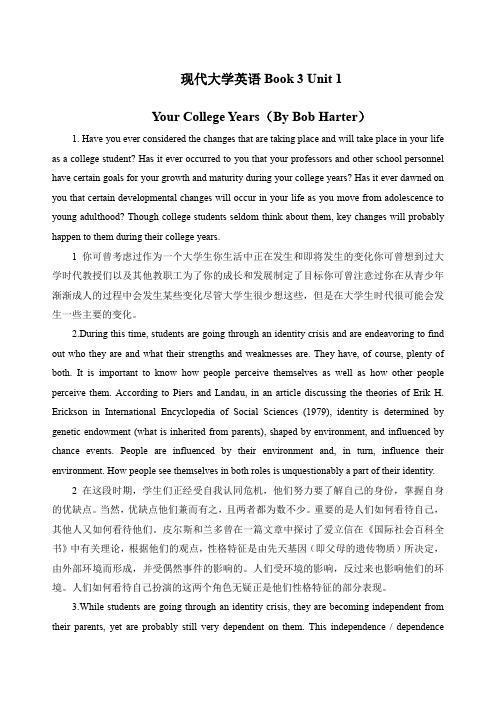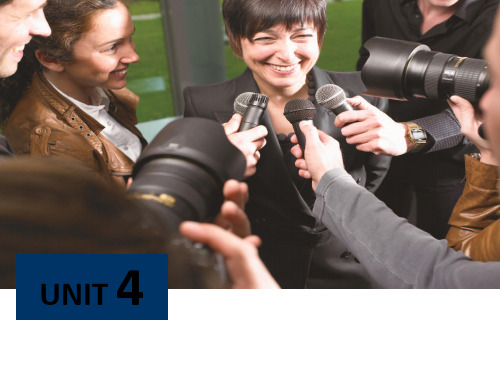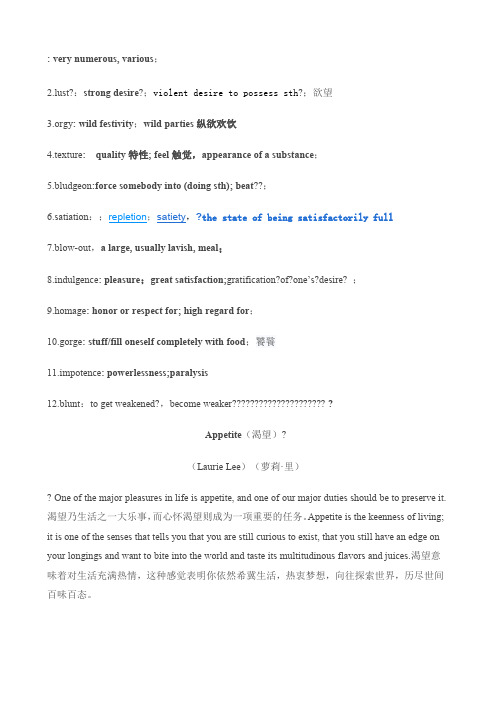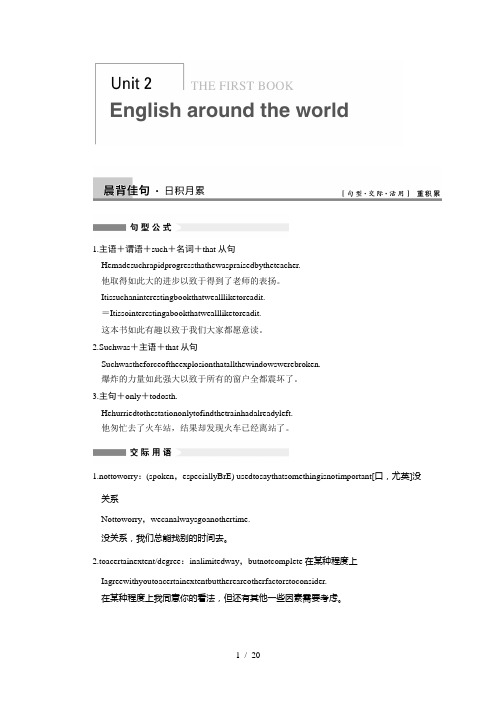bookunit
- 格式:pptx
- 大小:625.71 KB
- 文档页数:26

Unit 4Body languagePart I Communication: No Problem?Yesterday, another student and I, represent ing our university’s student association, went to the Capital International Airport to meet this year’s international students. They were coming to study at Beijing University. We would take them first to their dormitories and then to the student canteen. After half an hour of waiting for their flight to arrive, I saw several enter the waiting area looking around curiously. I stood for a minute watching them and then went to greet them.The first person to arrive was Tony Garcia from Colombia, closely follow ed by Julia Smith from Britain. After I met them and then introduce d them to each other, I was very surprised. Tony approach ed Julia, touch ed her shoulder and kissed her on the cheek! She step ped back appear ing surprised and put up her hands, as if in defence. I guess ed that there was probably a major misunderstanding. Then Akira Nagata from Japan came in smiling, together with George Cook from Canada. As they were introduced, George reach ed his hand out to the Japanese student. Just at that moment, however, Akira bow ed so his nose touch ed George’s moving hand. They both apologize d —another cultural mistake!Ahmed Aziz, another international student, was from Jordan. When we met yesterday, he moved very close to me as I introduced myself. I moved back a bit, but he came closer to ask a question and then shook my hand. When Darlene Coulon from France came dash ing through the door, she recognize d Tony Garcia’s smiling face. They shook hands and then kissed each other twice on each cheek, since that is the French custom when adult s meet people they know. Ahmed Aziz, on the contrary, simply nod ded at the girls. Men from Middle Eastern and other Muslim countries will often stand quite close to other men to talk but will usually not touch women.As I get to know more international friends, I learn more about this cultural “body language”. Not all cultures greet each other the same way, nor are they comfortable in the same way with touching or distance between people. In the same way that people communicate with spoken language, they also express their feelings using unspoken “language” through physical distance, action s or posture. English people, for example, do not usually stand very close to others or touch stranger s as soon as they meet. However, people from places like Spain, Italy or South American countries approach others closely and are more likely to touch them. Most people around the world now greet each other by shaking hands, but some cultures use other greetings as well, such as the Japanese, who prefer to bow.These actions are not good or bad, but are simply ways in which cultures have develope d. I have seen, however, that cultural customs for body language are very general - not all member s of a culture behave in the same way. In general, though, studying international custom s can certainly help avoid difficulties in today’s world of cultural crossroad s!Part II Showing our FeelingsBody language is one of the most powerful means of communication, often even more powerful than spoken language. People around the world show all kinds of feelings, wishes and attitude s that they might never speak aloud. It is possible to “read” others around us, even if they do not intend for us to catch their unspoken communication. Of course, body language can be misread, but many gesture s and actions are universal.The most universal facial expression is, of course, the smile – its function is to show happiness and put people at ease. It does not always mean that we are truly happy, however. Smiles around the world can be false, hiding other feelings like anger, fear or worry. There are unhappy smiles, such as when someone “loses face” and smiles to hide it. However, the general purpose of smiling is to show good feelings.From the time we are babies, we show unhappiness or anger by frown ing. In most places around the world, frowning and turning one’s back to someone shows anger. Making a fist and shaking it almost always means that someone is angry and threaten ing another person.There are many ways around the world to show agreement, but nod ding the head up and down is used for agreement, almost worldwide. Most people also understand that shaking the head from side to side means disagreement or refusal.How about showing that I am bore d? Looking away from people or yawn ing will, in most cases, make me appear to be uninterested. However, if I turn toward and look at someone or something, people from almost every culture will think that I am interested. If I roll my eyes and turn my head away, I most likely do not believe what I am hearing or do not like it.Being respectful to people is subjective, base d on each culture, but in general it is probably not a good idea to give a hug to a boss or teacher. In almost every culture, it is not usually good to stand too close to someone of a higher rank. Standing at a little distance with open hands will show that I am willing to listen.With so many cultural differences between people, it is great to have some similarities in body language. We can often be wrong about each other, so it is an amazing thing that we understand each other as well as we do!。

现代大学英语Book 3 Unit 1Your College Years(By Bob Harter)1. Have you ever considered the changes that are taking place and will take place in your life as a college student? Has it ever occurred to you that your professors and other school personnel have certain goals for your growth and maturity during your college years? Has it ever dawned on you that certain developmental changes will occur in your life as you move from adolescence to young adulthood? Though college students seldom think about them, key changes will probably happen to them during their college years.1你可曾考虑过作为一个大学生你生活中正在发生和即将发生的变化你可曾想到过大学时代教授们以及其他教职工为了你的成长和发展制定了目标你可曾注意过你在从青少年渐渐成人的过程中会发生某些变化尽管大学生很少想这些,但是在大学生时代很可能会发生一些主要的变化。
2.During this time, students are going through an identity crisis and are endeavoring to find out who they are and what their strengths and weaknesses are. They have, of course, plenty of both. It is important to know how people perceive themselves as well as how other people perceive them. According to Piers and Landau, in an article discussing the theories of Erik H. Erickson in International Encyclopedia of Social Sciences (1979), identity is determined by genetic endowment (what is inherited from parents), shaped by environment, and influenced by chance events. People are influenced by their environment and, in turn, influence their environment. How people see themselves in both roles is unquestionably a part of their identity.2在这段时期,学生们正经受自我认同危机,他们努力要了解自己的身份,掌握自身的优缺点。


: very numerous, various;2.lust?:strong desire?;violent desire to possess sth?;欲望y: wild festivity;wild parties纵欲欢饮4.texture: quality特性; feel触觉,appearance of a substance;5.bludgeon:force somebody into (doing sth); beat??;6.satiation?the state of being satisfactorily full7.blow-out,a large, usually lavish, meal;8.indulgence: pleasure;great satisfaction;gratification?of?one’s?desire?;9.homage: honor or respect for; high regard for;10.gorge: stuff/fill oneself completely with food;饕餮11.impotence: powerlessness;paralysis12.blunt:to get weakened?,become weaker????????????????????? ?Appetite(渴望)?(Laurie Lee)(萝莉·里)? One of the major pleasures in life is appetite, and one of our major duties should be to preserve it. 渴望乃生活之一大乐事,而心怀渴望则成为一项重要的任务。
Appetite is the keenness of living; it is one of the senses that tells you that you are still curious to exist, that you still have an edge on your longings and want to bite into the world and taste its multitudinous flavors and juices.渴望意味着对生活充满热情,这种感觉表明你依然希冀生活,热衷梦想,向往探索世界,历尽世间百味百态。

1.主语+谓语+such+名词+that从句Hemadesuchrapidprogressthathewaspraisedbytheteacher.他取得如此大的进步以致于得到了老师的表扬。
Itissuchaninterestingbookthatweallliketoreadit.=Itissointerestingabookthatweallliketoreadit.这本书如此有趣以致于我们大家都愿意读。
2.Suchwas+主语+that从句Suchwastheforceoftheexplosionthatallthewindowswerebroken.爆炸的力量如此强大以致于所有的窗户全都震坏了。
3.主句+only+todosth. Hehurriedtothestationonlytofindthetrainhadalreadyleft.他匆忙去了火车站,结果却发现火车已经离站了。
1.nottoworry:(spoken,especiallyBrE) usedtosaythatsomethingisnotimportant[口,尤英]没关系Nottoworry,wecanalwaysgoanothertime.没关系,我们总能找别的时间去。
2.toacertainextent/degree:inalimitedway,butnotcomplete在某种程度上Iagreewithyoutoacertainextentbutthereareotherfactorstoconsider.在某种程度上我同意你的看法,但还有其他一些因素需要考虑。
Ⅰ.词汇与派生联想记忆法1.voyage n.航行;航海→journey n.(尤指长途)旅行;行程2.native adj.本国的;本地的;n.本国人;本地人→benativeto产于某地的,土生土长的,当地的3.base v t.以……为根据;n.基部;基础;基地→base...on/upon...以……为基础/根据;建立在……基础上tter adj.较后的;后半的;(两者中)后者的→thelatter后者mand n.&v t.命令;指令;掌握→beatsb.’scommand听候某人的吩咐,服从某人的支配6.request n.&v t.请求;要求→atsb.’srequest按照某人的要求/请求7.recognize v t.辨认出;承认;公认→recognizesb./sth. as/to_be...承认某人/物是……构词记忆法1.official adj.官方的;正式的;公务的→office n.办公室;办公楼;办事处;政府部门;重要职位2.actually ad v.事实上;实际上→actual adj.真实的;实际的3.gradual adj.逐渐的;逐步的→gradually ad v.逐渐地;逐步地4.spelling n.拼写;拼法→spell v t.拼写5.identity n.本身;本体;身份→identify v t.确认;认出;鉴定6.fluent adj.流利的;流畅的→fluently ad v.流利地;流畅地7.frequent adj.频繁的;常见的→frequently ad v.常常地;频繁地age n.使用;用法;词语惯用法→use v t.使用→useful adj.有用的,有益的9.straight ad v.直接;挺直;adj.直的;正直的;笔直的→straighten v t.(使)变直,变正10.block n.街区;块;木块;石块→block v t.堵塞,阻塞;妨碍;堵住语境助记法Actually,eachlanguagehasitsown spelling,usage and expression.Wecan recognize a native oran officialgradually byhisorher accent.Weallknow f luent speakingrequires frequent practice.学情自测根据英文释义写出下列词汇1.actually:really;infact2.voyage:longtripbyseaorinspace3.fluent:abletospeakorwritealanguagewellmand:totell/ordersb.todosth.5.native:local根据句意用框中所给词的适当形式填空recognize,request,command,base,gradual6.Hisfirstbooktobepublishednextmonthisbasedonatruestory.7.Weshouldconsiderthestudents’requestthattheschoollibraryprovidemorebooksonpopularscience.wrence’snovelwaseventuallyrecognizedasaworkofgenius.9.ApplicantswillbeexpectedtohaveagoodcommandofEnglish.10.Theweathergraduallyimproved.Ⅱ.短语与拓展1.becauseof因为;由于→thanksto幸亏,由于eup走近;上来;提出→comeout出现;出版,发表;被获知,为人所知(v i.)3.atpresent现在;目前→forthepresent暂时4.makeuseof利用;使用→makethemost/bestof...充分利用……5.suchas例如……;像这种的(列举事物)→forexample例如(举例说明)5.playapart/rolein...在……中扮演一个角色;在……中起作用;参与6.morethan不仅仅;多于→otherthan除了7.withoutasecondthought不假思索→onsecondthought(s)重新考虑后学情自测根据语境选择框中所给短语的适当形式填空suchas,becauseof,playapart/rolein...,morethan,comeup,makethemostof1.Whatshesaidismore_thanhecanunderstand.2.Yourquestioncame_upatthemeeting.3.Weshouldmake_the_most_ofoursparetimetolearnEnglish.4.Shecanspeakfourlanguages,such_asEnglishandFrench.5.Theopen-aircelebrationhasbeenputoffbecause_ofthebadweather.6.The_role/partChinaisplaying_intheinternationalaffairsismoreandmoreimportant.Ⅲ.教材与高考1.(教材原句)SowhyhasEnglishchangedovertime?(P10)(2011·山东,30)I’msorryIdidn’tphoneyou,butI’vebeenverybusy________thepastcoupleofweeks.A.beyondB.withC.amongD.over命题思路本题考查介词词义、用法在具体语境中的运用,选D项。

英翻中As an important part of the American culture value system, "individualism" is admired by most American people. Americans view the family as a group whose primary purpose is to advance the happiness of individual members. In contrast to many other cultures, the primary responsibility of the American family member is not to advance the family as a group, either socially or economically. What would be best for the family is not usually considered to be as important as what would be best for the individual. With freedom comes the responsibility to care for oneself, for it is the freedom of choice that carries with it the responsibility: to accept the consequences of the choices. Many Americans give their children a lot of freedom because they want them to be independent and self-reliant. Along with the American emphasis on individual freedom, the belief in equality between parents and children also has had a strong effect on the family.作为美国文化价值体系的一个重要组成部分,"个人主义"受到大多数美国人的推崇。
L e s s o n 1Unit3.Shopping1. Thisunitisabout…Topics:KindsofretailoutletsHowsupermarketsmakeshoppersbuyThefirstsupermarketChineseclothingsizeconverterTraditionalshoppingvs.onlineshoppingeBaySkills:TalkingaboutshoppingandshoppinghabitsSpeaking:Role-play:Shoppingscenes GivingapersonalopinionaboutInternetuseWriting:Comparingmail-ordershoppingandInternetshoppingAguidedsummaryProject:AshoppingguideforyourneighborhoodGrammar:Adjectives:ComparisonofadjectivesShoppingHabitsHowoftendoyourfamilyshopWheredoyouusuallygoshoppingUsefulExpressionsweekly;dailyoccasionallyduringtheweekdepartmentstores;onlineretailers2. FocusWorkwithapartner.2.1Labelthephotoswithanexpressionfromthebox.1.supermarket2.market3.cornershop4.streetvendor5.specialiststore6.onlineretailer(chemist’s)7.departmentstore8.chainstore9.shoppingmall2.2WheredoyoudoyourshoppingUsefulExpressionsIoften/sometimes/neverdomyshopping/shopata/andepartmentstore/…Mypartner/He/She/(sb.’name)doeshis/hershopping/…ata/an…3.TextStudy(PassageA)3.1 BackgroundInformationonlineshopping✧onlineretailing,?theactofpurchasingproductsorservicesovertheInternet Keywords:physicalstoresonlinestoresconvenientbargainholidayseasonwaitinlonglinesconsumerism✧abeliefthatencouragesthepurchaseofgoodsandservicesinever-greateramounts ✧Keywords:✧consumerist✧movement✧asetofpolicies✧regulate✧standard✧manufacturers✧intheinterestsofimpulsepurchase✧impulsebuying,anunplanneddecisiontobuyaproductorservice,madejustbeforeapurchase✧Keywords:✧impulsepurchaser✧impulsebuyer✧financialdifficulty✧familydisapproval✧feelingofguilt✧disappointment3.2WordsandExpressionsexpert n.专家trolley n.手推车purchase n.购置物shoppinglist 购物单pepper n.辣椒sorted adj.properlyarrangedorplanned分选的pre-packed adj. alreadypacked预先包装的specialoffer bargain特价商品packet n.小包,小袋bakery n.面包烘房roll n.小圆面包display n.展列canned adj.罐装的bottled adj.瓶装的frozen adj.冷冻的goods n.货品delicatessen n.熟食店freshness n.新鲜食品electrical adj.电气的product n.商品essential n.必需品butter n.黄油impulseitem 一时冲动购买的商品profit n.利润brandname 品牌processedfood 加工食品pre-cookedmeal 半成品食品profitable adj.money-making盈利的ateyelevel 齐眼的高度checkout n.收银台leaflet n.传单loan n.贷款insurance n.保险mobilephone 移动电话creditcard 信用卡3.3 Text译文被动消费步入大型超市时,千万不能大意!那帮精明狡诈的人已经看到了你的到来。
Door closer,are you? 关门者”,你是吗?1 The next time you're deciding between rival options, one which is primary and the other which is secondary, ask yourself this question: What would Xiang Yu do?1 下次你要在两个难于取舍的、主要的和次要的选择之间做决定时,不妨问自己这样一个问题:项羽会怎么做?2 Xiang Yu was a Chinese imperial general in the third century BC who took his troops across the Zhang River on a raid into enemy territory. To his troops' astonishment, he ordered their cooking pots crushed and their sailing ships burned.2 项羽是公元前三世纪中国古代王朝的一位将军。
他带领他的部队横渡漳河,突袭进入了敌方的领地。
他下令砸锅烧船,令他的部队大为震惊。
3 He explained that he was imposing on them a necessity for attaining victory over their opponents.What he said was surely motivating, but it wasn't really appreciated by many of his loyal soldiers as they watched their vessels go up in flames. But the genius of General Xiang Yu's conviction would be validated both on the battlefield and in modern social science research. General Xiang Yu was a rare exception to the norm, a veteran leader who was highly respected for his many conquests and who achieved the summit of success.3 他解释道,他强加给他们的是战胜对手的必要举措。